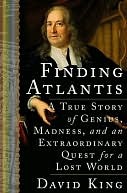
Finding Atlantis
A True Story of Genius, Madness, and an Extraordinary Quest for a Lost World
کتاب های مرتبط
- اطلاعات
- نقد و بررسی
- دیدگاه کاربران
نقد و بررسی

March 28, 2005
Few lives are as sadly instructive as that of the dreamer who, by reaching for the stars, falls crashing to earth. Such is the tale of a 17th-century Swedish polymath and gifted eccentric, Olof Rudbeck. Univeristy of Kentucky historian King relates how Rudbeck, trained in his youth as physician (he discovered the lymphatic glands), mastered fields as diverse as architecture, botany, shipbuilding, etymology, musical composition and mythology, among others. It was an ancient Norse saga that set him on the path to what he believed would lead to his greatest triumph. Enchanted by circumstantial evidence and supported by his own breathtakingly inventive archeological and etymological research, Rudbeck in 1679 astonished his Uppsala University colleagues with the announcement that he had discovered Atlantis—in Old Uppsala. Fiercely disputatious and uncompromising when it came to his own genius, Rudbeck had previously poisonously offended many influential colleagues; his work was ridiculed and he died in obscurity. King is marvelous at elaborating Rudbeck's theories and his heroic defense against charges of forgery and "foul-ugly fraud." One wishes, however, that King had dealt definitely with the forgery charges. His trust in his own subject despite the evidence is honorable but perhaps misplaced. Still, King tells his tale with the pace and appeal of a classic whodunit. 20 b&w illus. Agent, Suzanne Gluck.

April 15, 2005
Center stage in this history of a history book is the rollicking, fantastical figure of Olof Rudbeck (1630-1702). After reading Rudbeck's monumental " Atlantica" (1679), historian King unpacks its plausible but reckless chains of reasoning and reassembles the mass into a marvelous account of the Swedish scholar's obsessions. Rudbeck was a professor of medicine at Uppsala University, and his restless mind seems to have seldom been idle. Rudbeck switched from physiology, in which he made his name as discoverer of the lymphatic system, to the study of the Viking sagas, just then coming to scholarly light. Connecting the sagas with the gods of Norse and Greek mythology, and with Plato's lost continent of Atlantis, Rudbeck proposed an astounding theory: Atlantis was located in Sweden! Odd though the idea was, King explains that Rudbeck's protomodern research methods in archaeology and etymology gained acceptance for his theory. Restoring this colorful eccentric to life, King reveals his talent for narrative flow and portraiture in a biography that will thoroughly inveigle history readers.(Reprinted with permission of Booklist, copyright 2005, American Library Association.)

























دیدگاه کاربران